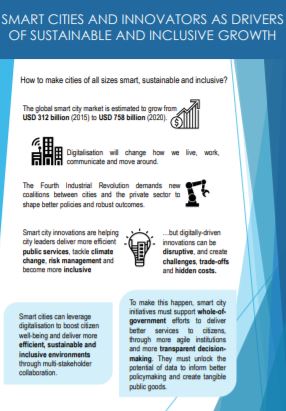Développement régional, urbain et rural
The OECD Programme on Smart Cities and Inclusive Growth
|
What's the issue? Over the past two decades, “smart cities” have proliferated around the globe as a way to build more efficient and liveable urban environments. Initially, the concept of “smart cities” was largely supply-driven, with the private sector taking the lead in defining both the problem and the solution. The time has come to take stock of these experimentations! Are smart cities just a buzzword, or do they really deliver better opportunities and well-being for all residents?
What can the OECD offer? Our work on smart cities and inclusive growth seeks to bridge efficiency and social inclusion to deliver better opportunities and better lives for all residents. The OECD's Programme on “Smart Cities and Inclusive Growth” aims to:
About the OECD Roundtable on Smart Cities and Inclusive Growth The OECD Roundtable on Smart Cities and Inclusive Growth gathers various stakeholders to take stock of research and share policies, practices and knowledge on how to get smart city initiatives right. Smart cities represent a key opportunity to help cities reach their climate objectives and drive the global net-zero transition. While digital innovation and new technologies can foster considerable reductions in greenhouse gas emissions across many urban sectors, such as buildings and transports, their take-up or impacts on emission reduction have so far remain limited. The 3rd OECD Roundtable on Smart Cities and Inclusive Growth brings together key stakeholders from cities, national governments, the private sector, civil society, academia and international organisations to:
|
|

Related documents
- OECD Roundtable on Smart Cities and Inclusive Growth
- Smart Cities and Inclusive Growth
- Enhancing the Contribution of Digitalisation to the Smart Cities of the Future (English) (French)
- Trends for Smart City Strategies in Emerging Asia
- Housing Dynamics in Korea - Building Inclusive and Smart Cities
- Leveraging Digital Technology and Data for Human-Centric Smart Cities
- Measuring Smart City Preformance in COVID-19 Times: Lessons From Korea and OECD Countries
For more information, please contact smart.cities@oecd.org
Documents connexes
